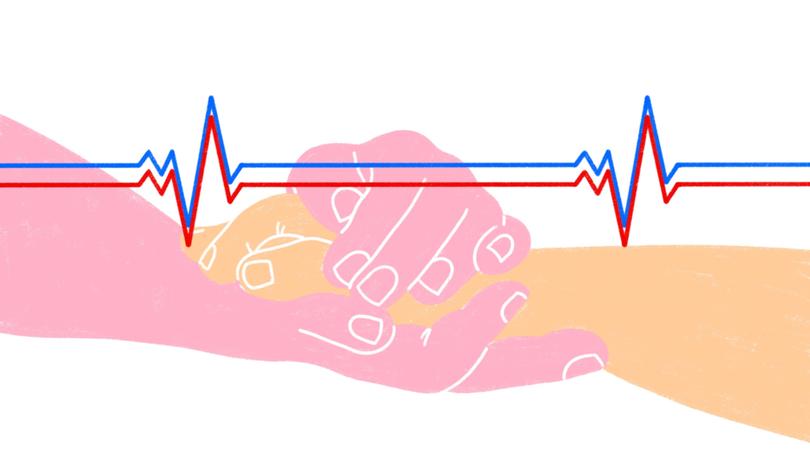Five revolutionary cancer therapies that will change the lives of patients
From a daily tablet to a ‘smart bomb’ — here are the majoradvances revealed at the world’s biggest cancer conference.

A daily pill to tackle the deadliest lung tumours, “smart bomb” drugs that stop blood cancer in its tracks and a jab so potent it could significantly slash the global death toll from skin cancer.
These were just some of the breakthroughs reported at the annual meeting of the American Society of Clinical Oncology (ASCO) in Chicago last week.
Thousands of the world’s top cancer clinicians gathered to hear how science is gaining ground in the battle against a disease which still kills about 167,000 people each year in the UK.
Sign up to The Nightly's newsletters.
Get the first look at the digital newspaper, curated daily stories and breaking headlines delivered to your inbox.
By continuing you agree to our Terms and Privacy Policy.And it’s no exaggeration to say that some of the advances unveiled are potentially among the most significant we have ever seen.
As one of the reporters covering the event, I heard gasps from audience members as researchers unveiled findings that promised to slash deaths from forms of the disease that were, until fairly recently, considered a death sentence.
It’s fair to say some results were beyond everyone’s expectations, including those doing the studies.
Better still, many of the findings apply to drugs and treatments that could be making a difference to cancer patients’ lives in a matter of months, not years.
Others may be further down the line but still offer hope that cancer — at least most forms of it — will one day be no more than a disease that affects people’s lives but will no longer shorten them.
In pole position is a whole new generation of vaccines, custom-made to stop cancers from returning.
And one of the highlights from Chicago was the news that thousands of NHS patients will get personalised cancer jabs over the next year as part of a major push by the NHS to enrol Britons in dozens of vaccine trials.
“These vaccines are the most promising I’ve seen,” said Dr Julie Gralow, one of the most senior cancer experts in the US and ASCO’s chief medical officer.
She added that it may be several years before doctors are able to routinely use them on the front line, but “there is a bunch of practical stuff which could change patient care tomorrow”
So what are the key take-home developments — away from the headlines — that, as The Mail on Sunday’s Health Editor, I think you need to know about?
SKIN CANCER DRUGS WORK BETTER BEFORE SURGERY

The effect was so pronounced that most patients who received immunotherapy before surgery needed only two doses, compared with those who got the drugs afterwards who needed 12.
“These results are unprecedented,” Dr Lynn Schuchter, a melanoma expert at the University of Pennsylvania and ASCO president, said.
“Patients currently receive a whole year of treatment after melanoma surgery. But we now know that, for many, just two rounds of immunotherapy before the procedure are enough.
“When I go back to my patients, I’ll have a new approach on how to treat them.”
Melanoma affects more than 15,000 Britons every year, and often spreads to other parts of the body. It is the most deadly type of skin cancer, killing about 2500 Britons every year. It often looks like an oddly shaped mole, usually black or brown in colour.
Currently, NHS doctors will surgically remove the melanoma as well as nearby lymph nodes — bean-shaped structures throughout the body that filter out harmful substances such as viruses.
The lymph nodes are often the first place that melanoma spreads.
Following surgery, patients usually get immunotherapy treatment — drugs which train the body to spot and destroy cancer cells.
But if melanoma has spread into the lymph nodes, there is a good chance the disease will return, with 50 per cent of this patient group living no longer than five years after diagnosis.
In this new study, by the Netherlands Cancer Institute in Amsterdam, more than 200 patients were either given two immunotherapy drug infusions — nivolumab and ipilimumab — twice over a six-week period before surgery, or 12 times over a year after surgery.
When their lymph nodes were removed, the tissue was tested for the presence of cancer cells.
If there were signs of the disease, then participants received immunotherapy for another year.
However, six out of 10 were cancer-free, meaning they did not need further treatment after surgery.
Patients who received immunotherapy before surgery were 45 per cent less likely to see their cancer return within a year than those who got the drugs afterwards.
Experts believe this stark difference is because there are more cancer cells in the body before surgery, which gives the immune system more opportunities to learn to recognise the disease.
ONCE-A-DAY TABLET FOR LUNG CANCER
In my opinion, this is arguably one of the most significant cancer breakthroughs in recent times — a daily pill to treat a particularly nasty type of lung cancer.
And I’m not alone. When the findings were presented at ASCO, they got a standing ovation from other scientists.
About eight in 10 lung cancer patients in the UK have a form of the disease called non-small cell lung cancer.
Of those, roughly 15 per cent carry what is known as a genetic EGFR mutation, which raises the risk the body will create abnormal, cancerous cells, meaning the disease is likely to return regardless of how it is treated.
The new study, at Emory University in Atlanta, Georgia, gave 100 EGFR mutation patients with extensive lung tumours a daily tablet called osimertinib once they had completed chemo.
Osimertinib is designed to interrupt the EGFR gene’s protein pro-duction, stopping it from creating any more cancer cells.
When the trial data was presented, there were audible gasps.
Patients carrying the EGFR mutation who were given osimertinib were 84 per cent less likely to die or see their cancer grow, compared with those who received a placebo.
On average, patients taking osimertinib did not die or see their cancer progress for three-and-a-half years.
Those not on the treatment typically died or saw their disease spread in less than six months.
Some trial participants are living healthy lives more than seven years later.
Osimertinib is already available on the NHS for patients with EGFR who have had successful surgery to remove lung cancer, as well as those with advanced cancer that has spread throughout the body.
But experts say there is an unmet need for patients who have cancer that has spread throughout the lungs, making it impossible to surgically remove, but has not moved into other organs yet.
These so-called locally advanced patients make up a quarter of all new lung cancer cases in the UK.
“This will be practice-changing for locally advanced patients,” Dr David Spigel, a lung cancer expert at the Sarah Cannon Research Institute in Nashville, Tennessee,” said.
THE TUMOUR-ZAPPING IMMUNITY BOOSTER
There was more good news on lung cancers — a new drug regime to tackle one of the most aggressive types, small cell lung cancer, which affects around 7000 people in the UK annually and is usually caused by smoking.
For patients in the early stages of the disease, when the cancer has not yet begun to spread, treatment has remained largely unchanged since the 1980s, with most receiving regular doses of chemotherapy and radiotherapy.
Despite this, less than a third of patients will survive longer than five years after diagnosis, as the cancer spreads outside of the lungs.
But the new study found that offering an immune-boosting drug called durvalumab extends their lives by slowing this spread.
Durvalumab is a PD-L1 inhibitor, which helps the body spot cancer cells hiding from the immune system, allowing it to target and destroy them.
It is given as a monthly infusion after the patient has had 12 weeks of chemotherapy and six weeks of radiotherapy.
Three years after beginning durvalumab, patients were 25 per cent less likely to die compared with those on a placebo, buying them roughly two extra years.
Experts said that the 730-patient trial by the Sarah Cannon Research Institute may change how early-stage small cell lung cancer is treated.
“These are very encouraging times for lung cancer patients,” Dr Suresh Ramalingam, oncologist at Emory University, Georgia, and lead investigator of the osimertinib trial said.
We’re getting better at curing the disease.
A ‘SMART-BOMB’ TO HALVE BLOOD CANCER DEATHS
A new “smart-bomb” drug which seeks and destroys cancer cells can extend the lives of patients with incurable blood cancer.
Nearly 6000 Britons are diagnosed with multiple myeloma each year, and 1500 die.
It affects plasma cells — a type of white blood cell found in the bone marrow.
While it can be slowed, most cases cannot be cured. And only a third of patients will survive for ten years or more after diagnosis.
“Triplet” or “quadruplet” treatments — giving patients multiple drugs at once — are particularly effective at slowing multiple myeloma.
In a game-changing trial, by the Princess Margaret Cancer Centre in Toronto, a new drug, belantamab mafodotin, was combined with two existing drugs, pomalidomide and dexamethasone.
The new drug is an antibody drug conjugate that binds to cancer cells and directly delivers a potent dose of chemotherapy.
The combination was given to multiple myeloma patients who had failed to respond to one previous treatment.
The belantamab mafodotin was given monthly as an infusion, while the other two were taken as daily tablets.
Nearly two years after beginning it, participants were half as likely to die or see their cancer spread, compared with those taking pomalidomide, dexamethasone, and a cancer drug called bortezomib.
Experts say the trial means elantamab mafodotin will be offered to multiple myeloma patients who have not responded to less intensive treatment.
“This is poised to be the new treatment option for these patients,” Dr Oreofe Odejide, oncologist at the Dana-Farber Cancer Institute in Boston, US, said.
WHEN OVARIAN CANCER MAY NOT NEED SURGERY
Not all studies concluded that patients needed more treatment. In fact, one key piece of research found that, for ovarian cancer, it’s better to have less.
In a decade-long trial, researchers found that a common surgical procedure – a lymphadenectomy – may do more harm than good.
It involves removing the lymph nodes near the ovaries in case the cancer has spread there, and is often carried out by the NHS on patients whose cancer has spread around the body.
However, lymph node removal surgery complications are common, often causing infections or severe blood loss.
Some 7500 women in the UK are diagnosed with ovarian cancer every year.
As few symptoms arise during the early stages, it’s usually detected only once the disease has spread around the body.
About 4000 Britons die from ovarian cancer every year.
In the new study, the Nantes University in France enrolled 380 patients with advanced ovarian cancer who did not have signs of the disease in their lymph nodes.
Half had a lymphadenectomy.
Nine years later, there was no difference in the number of patients still alive – among both groups, fewer than half the participants had survived the disease, with the majority seeing it return within two years.
However, those who did not have a lymphadenectomy were nearly onethird as likely to require additional surgery due to complications such as bleeding.
“We don’t want to give patients unnecessary surgery,” says ASCO chief medical officer Dr Julie Gralow.
“We really need to focus on new drug therapies for ovarian cancer as it’s not the lymph nodes which are killing people, it’s the disease spreading elsewhere.”
